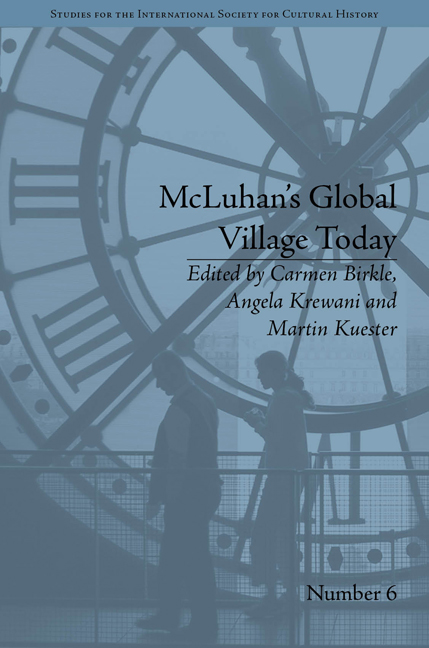Book contents
- Frontmatter
- CONTENTS
- List of Contributors
- List of Figures
- McLuhan's Global Village Today: An Introduction
- Part I McLuhan and Media Theory
- Part II McLuhan and Literature
- Part III McLuhan and Technical Media
- 11 Radio Voices: Reflections on McLuhan's Tribal Drum
- 12 McLuhan's Paradigms and Schafer's ‘Soundscape’: Parallels, Influences, Envelopes, Shifts
- 13 Literary Modernists, Canadian Moviegoers and the New Yorker Lobby: Reframing McLuhan in Annie Hall
- 14 The Animated Medium is the Animated Message (?): Reading Animated Moving Pictures with Marshall McLuhan
- 15 Marshall McLuhan and the Emergence of American Television Theory
- 16 ‘The Medium in Your Pocket’: A McLuhanian Approach to New Media
- Notes
- Index
11 - Radio Voices: Reflections on McLuhan's Tribal Drum
from Part III - McLuhan and Technical Media
- Frontmatter
- CONTENTS
- List of Contributors
- List of Figures
- McLuhan's Global Village Today: An Introduction
- Part I McLuhan and Media Theory
- Part II McLuhan and Literature
- Part III McLuhan and Technical Media
- 11 Radio Voices: Reflections on McLuhan's Tribal Drum
- 12 McLuhan's Paradigms and Schafer's ‘Soundscape’: Parallels, Influences, Envelopes, Shifts
- 13 Literary Modernists, Canadian Moviegoers and the New Yorker Lobby: Reframing McLuhan in Annie Hall
- 14 The Animated Medium is the Animated Message (?): Reading Animated Moving Pictures with Marshall McLuhan
- 15 Marshall McLuhan and the Emergence of American Television Theory
- 16 ‘The Medium in Your Pocket’: A McLuhanian Approach to New Media
- Notes
- Index
Summary
Suppose he is what he sounds like, the most important thinker since Newton, Darwin, Einstein, and Pavlov … what if he is right?
Tom WolfeRadio – A Dead Medium?
Beyond the so-called ‘golden age’ of radio, the medium that defined North American culture and set the patterns for media that followed had become almost extinct for the better part of the twentieth and the beginning of the twenty-first century. Radio had turned, in Bruce Sterling's words, almost into a ‘dead medium’. It tended to be forgotten by the public and, by and large, ignored by academics.
Radio historian Michele Hilmes, for instance, believes that the major reason for the neglect of radio is the advent of television, a brand new medium that was invented and popularized precisely at a time when a rapidly growing interest in the study of media began to develop. Marshall McLuhan, too, may have fallen prey to the fascination of the new television medium. He is regarded as the theorist of television par excellence, and even a cursory look at his writing may readily lend proof to this observation. Thus, it may come as a surprise that McLuhan also wrote about the radio, but not at great length. He probably didn't think of radio as dead, but he didn't devote much attention to the study of the old mass medium.
- Type
- Chapter
- Information
- McLuhan's Global Village TodayTransatlantic Perspectives, pp. 117 - 130Publisher: Pickering & ChattoFirst published in: 2014



